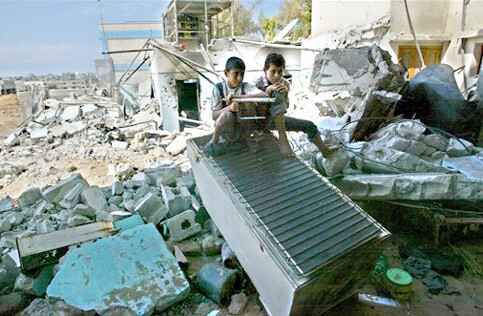Centre On Housing Rights and Evictions 11 August 2005

More than half of the original Palestinian population has been displaced from Palestine, and some six million Palestinian refugees need to achieve residential justice through the exercise of their legal rights to housing, land and property restitution. (PCHR)
GENEVA — The United Nations is expected to adopt a sweeping series of principles today that urge governments everywhere to ensure all refugees and persons displaced due to conflict and natural disasters are entitled to return to, recover and reside in their original homes, lands and properties.
Prepared by the UN’s Special Rapporteur on Housing and Property Restitution, Paulo Sergio Pinheiro of Brazil, the ‘Pinheiro Principles’ will provide the first consolidated global standard on the housing, land and property rights of the displaced.
“The best solution to the plight of millions of refugees and displaced persons around the world is to ensure they attain the right to return freely to their countries and to have restored to them housing and property of which they were deprived during the course of displacement, or to be compensated for any property that cannot be restored to them. It is the most desired, sustainable, and dignified solution to displacement”, said Pinheiro.
Millions of refugees and displaced persons - Palestinians, Sudanese, Croatian and Kosovar Serbs, Bhutanese, Burmese and others - continue to be prevented from returning to their former homes and lands. Many countries responsible for displacing persons from their homes have adopted laws seeking to confiscate the homes, land and properties of refugees and displaced persons. The Pinheiro Principles firmly declare such laws as unlawful, and urge all States which have adopted such laws to repeal them.
There are currently 12.4 million refugees and an additional 25 million internally displaced persons (IDPs) worldwide who have experienced loss of land, housing and property.
Scott Leckie, Executive Director of the Geneva-based Centre on Housing Rights and Evictions (COHRE), an independent human rights organisation with extensive experience working on restitution themes, added, “The right to housing, land and property restitution is increasingly recognized as a fundamental element of the right to return for both refugees and IDPs. The right to return is now understood to encompass not merely returning to one’s country, but also to one’s original home, should one wish. This is a very positive development for refugees and IDPs wishing to return home.”
The Principles on Housing and Property Restitution for Refugees and Other Displaced Persons, developed by Pinheiro during his mandate as the Special Rapporteur, articulates standards regarding protection from displacement and strengthening restitution procedures, institutions, mechanisms and legislation from a human rights framework.
The Principles aim to develop a set of international standards providing a universal approach to housing, land and property restitution policy at both the national and international levels, by drawing upon existing international human rights and humanitarian law.
Leckie said, “Housing and property restitution is an essential element of reconstruction and recovery in post-conflict situations. It is a primary means of reversing ‘ethnic cleansing’ and vital to securing a war-torn nation’s future stability. The plight of refugees and IDPs such as the six million Palestinian refugees, and millions of other displaced persons in Sudan, Sri Lanka, the Balkans and elsewhere, clearly indicates that the prospects for workable peace agreements are highly unlikely until the restitution question is properly addressed.”
Leckie added, “The Middle East is a good example of this. The dispossession of Palestinian homes, lands and properties remains at the heart of the longstanding conflict which today seems no closer to being resolved. More than half of the original Palestinian population has been displaced from Palestine, and some six million Palestinian refugees need to achieve residential justice through the exercise of their legal rights to housing, land and property restitution. Any peace agreement between the Israelis and Palestinians will not be feasible until Israel acknowledges the right of Palestinians to return to and re-possess their homes which are now controlled by Israel.”
Leckie noted, “The development of this groundbreaking standard on restitution marks a real achievement in the progression of international protection for millions who have been forcibly uprooted from their homes and lands. The Pinheiro Principles will further the rights of refugees and IDPs and help turn back the clock on some of the world’s most serious human rights violations.”
“The adoption of the Principles by the UN will be an important step towards ensuring all restitution strategies, policies and programmes, as implemented at both the national and international level, reflect international human rights and humanitarian law and standards. Displacement and forced migration are all too often results of massive human rights violations, including forced evictions. Displacement in most cases is the entry point to a future of uncertainty and insecurity, rendering individuals vulnerable to other human rights violations”, added Pinheiro.
More Information
Related Links